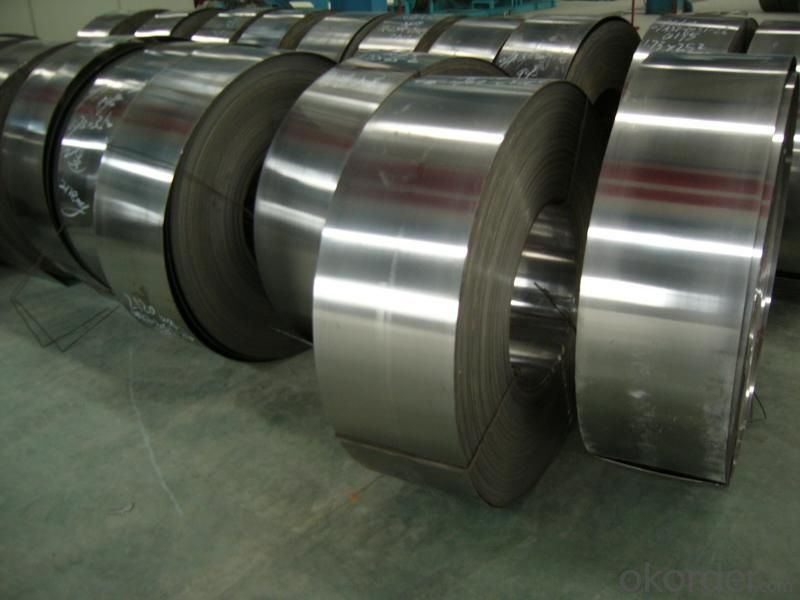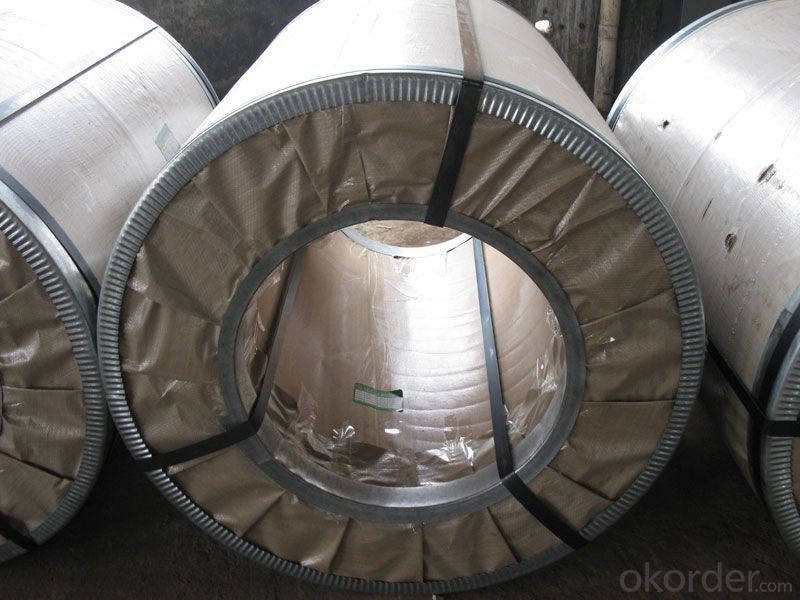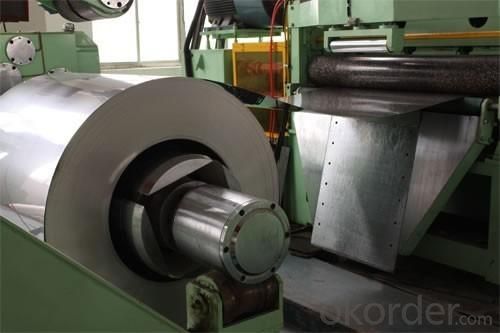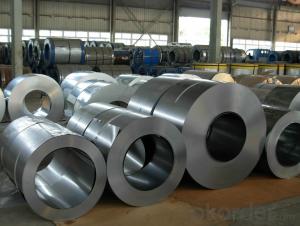Cold Rolled Steel Coil in Low Price China
- Loading Port:
- China main port
- Payment Terms:
- TT OR LC
- Min Order Qty:
- 50 m.t.
- Supply Capability:
- 10000 m.t./month
OKorder Service Pledge
OKorder Financial Service
You Might Also Like
Cold Rolled Steel Coil in Low Price China
1.Structure Description:
The raw material of cold rolled steel coil/sheet is high quality hot rolled product, and after pickling continuous rolling, degreasing, annealing,skin pass,slitting and cut to length line etc. Along with it many kinds of new technology and new process of global cold rolling production have been applied.
2.Main Features of the Cold Rolled Steel:
• Excellent process capability
• Smooth and flat surface
• Workability, durability
• Excellent heat resistance performance
3. Images



4.Cold Rolled Steel Specification
Standard:AISI,ASTM,DIN,GB,JIS,JIS G3302 ASTM 653M EN10142
Grade: Q195~Q345
Thickness: 0.16mm~2.0mm
Width: 1250mm MAX
Coil weight:3-12 MT
5. FAQ of Cold Rolled Steel
1.How to guarantee the quality ?
We have established the international advanced quality management system, we have strict quality test;We resolutely put an end to unqualified products flowing into the market. At the same time, we will provide necessary follow-up service assurance.
2. How long can we receive the product after purchase?
Usually within thirty working days after receiving buyer’s advance payment or LC. We will arrange the factory manufacturing . The cargo readiness usually takes 15-25 days, but the shipment will depend on the vessel situation.
- Q:How are steel coils loaded onto a truck?
- Steel coils are typically loaded onto a truck using a combination of machinery and manual labor. The process involves several steps to ensure the safe and efficient loading of the coils. Firstly, the truck must be properly prepared for the loading process. This includes ensuring that the truck's bed is clean and free from any debris or obstacles that may interfere with the loading. The truck's bed may also be lined with protective materials such as rubber mats to prevent damage to both the coils and the truck. Next, a forklift or crane is used to lift and position the steel coils onto the truck. The forklift or crane operator must carefully maneuver the coils into place, ensuring that they are balanced and secured to prevent any shifting during transportation. It is essential to follow proper lifting techniques and safety protocols to avoid accidents or damage to the coils. Once the coils are positioned on the truck, they may be secured using various methods. This can include using straps, chains, or other restraints to hold the coils in place and prevent them from moving or falling during transit. The restraints must be properly tightened and checked to ensure they can withstand the weight and movement of the coils. It is important to note that the specific loading process may vary depending on the size and weight of the steel coils, as well as the equipment available. Some trucks may have specialized loading systems designed specifically for steel coils, which can streamline the loading process and enhance safety. Overall, loading steel coils onto a truck requires careful planning, skilled operators, and appropriate equipment. Following proper procedures and safety measures is crucial to ensure the successful transportation of the coils and to prevent any accidents or damage.
- Q:What are the different types of steel coil packaging methods?
- There are several different types of steel coil packaging methods, including but not limited to: strapping, wrapping, banding, shrink-wrapping, palletizing, and using steel coil covers or caps. Each method serves a specific purpose and provides varying levels of protection and stability during transportation and storage.
- Q:How do steel coils contribute to the manufacturing of agricultural machinery?
- The manufacturing of agricultural machinery heavily relies on steel coils, which play a vital role in this process. Typically, these coils are crafted from top-notch steel that possesses exceptional strength, durability, and resistance to corrosion. To begin with, agricultural machinery heavily relies on steel coils for the construction of its main structural components, including the chassis, frames, and supports. These components must endure heavy loads, extreme weather conditions, and rough terrains. Thanks to the strength and resilience of steel coils, the machinery can effectively handle these challenging environments and operate efficiently. In addition, steel coils find application in the production of various moving parts and mechanisms within agricultural machinery. For example, gears, shafts, and axles, which are crucial for power transmission and rotational motion transformation, are created using steel coils. The high tensile strength and excellent machinability of steel make it an ideal material for these essential components, ensuring their reliability and longevity. Moreover, steel coils contribute to the manufacturing of agricultural machinery by providing a protective layer against wear and tear. Often, these coils are coated with specialized finishes or paints to enhance their resistance to rust, chemicals, and abrasion. This protective layer significantly prolongs the machinery's lifespan, reduces the need for frequent maintenance and repairs, and ultimately increases its overall efficiency and productivity. Furthermore, the versatility of steel coils allows for customization and adaptation to meet the specific requirements of agricultural machinery. Manufacturers can shape and mold the coils into different sizes and dimensions, enabling the production of machinery suitable for various farming practices and applications. Whether it's tractors, harvesters, or irrigation systems, steel coils are crucial for creating versatile and dependable agricultural machinery. In conclusion, steel coils are essential in the manufacturing of agricultural machinery due to their strength, durability, resistance to corrosion, and customization capabilities. From structural components to moving parts and protective coatings, steel coils greatly contribute to the efficiency, reliability, and longevity of agricultural machinery, thus providing significant support to the global agricultural industry.
- Q:I understand that damascus sword steel was made by folding the strip of steele double , reheating, hammering, folding again and so forth hundreds of times. Was this the same or very nearly the same techmique the japs used making the sword blades the samari swords?(forgive the misspelling)
- Folded Damascus Steel
- Q:How are steel coils used in the manufacturing of electrical components?
- Steel coils are commonly used in the manufacturing of electrical components as they provide a sturdy and reliable framework. They are used to create magnetic cores, which play a crucial role in transformers, motors, and generators. Additionally, steel coils are utilized in the production of inductors and solenoids, where they help generate and control magnetic fields. Overall, steel coils are essential in electrical component manufacturing due to their ability to enhance the efficiency and functionality of these devices.
- Q:What are the quality standards for steel coil manufacturing?
- The quality standards for steel coil manufacturing typically include factors such as dimensional accuracy, surface finish, mechanical properties, chemical composition, and adherence to industry-specific standards set by organizations like ASTM or ISO.
- Q:What are the common transportation defects in steel coils?
- Common transportation defects in steel coils may include edge damage, surface scratches, deformation, and coil slippage. These defects can occur due to mishandling during loading, unloading, or transit, leading to potential quality issues and compromised structural integrity of the steel coils.
- Q:What is the standard length of steel coils?
- The standard length of steel coils can vary depending on the specific industry and application. However, a common standard length for steel coils is typically around 30 feet or 9.1 meters.
- Q:Steel steps steel guard rail steel chair. You see where I'm going with this.
- Lex Luger's right elbow... OH YESH!!!! I SEE WERE YOU ARE GOING WITH THIS!!!
- Q:How are steel coils inspected for quality control?
- Steel coils are inspected for quality control through various methods. One common method is visual inspection, where trained professionals visually examine the coils for any surface defects, such as scratches, dents, or discoloration. Additionally, non-destructive testing techniques like ultrasonic testing are used to detect any internal defects, such as cracks or voids. Dimensional measurements are also taken to ensure the coils meet the required size and thickness specifications. These comprehensive inspections help ensure the overall quality and integrity of steel coils before they are used in various industries.
1. Manufacturer Overview |
|
|---|---|
| Location | |
| Year Established | |
| Annual Output Value | |
| Main Markets | |
| Company Certifications | |
2. Manufacturer Certificates |
|
|---|---|
| a) Certification Name | |
| Range | |
| Reference | |
| Validity Period | |
3. Manufacturer Capability |
|
|---|---|
| a)Trade Capacity | |
| Nearest Port | |
| Export Percentage | |
| No.of Employees in Trade Department | |
| Language Spoken: | |
| b)Factory Information | |
| Factory Size: | |
| No. of Production Lines | |
| Contract Manufacturing | |
| Product Price Range | |
Send your message to us
Cold Rolled Steel Coil in Low Price China
- Loading Port:
- China main port
- Payment Terms:
- TT OR LC
- Min Order Qty:
- 50 m.t.
- Supply Capability:
- 10000 m.t./month
OKorder Service Pledge
OKorder Financial Service
Similar products
New products
Hot products
Hot Searches
Related keywords




























